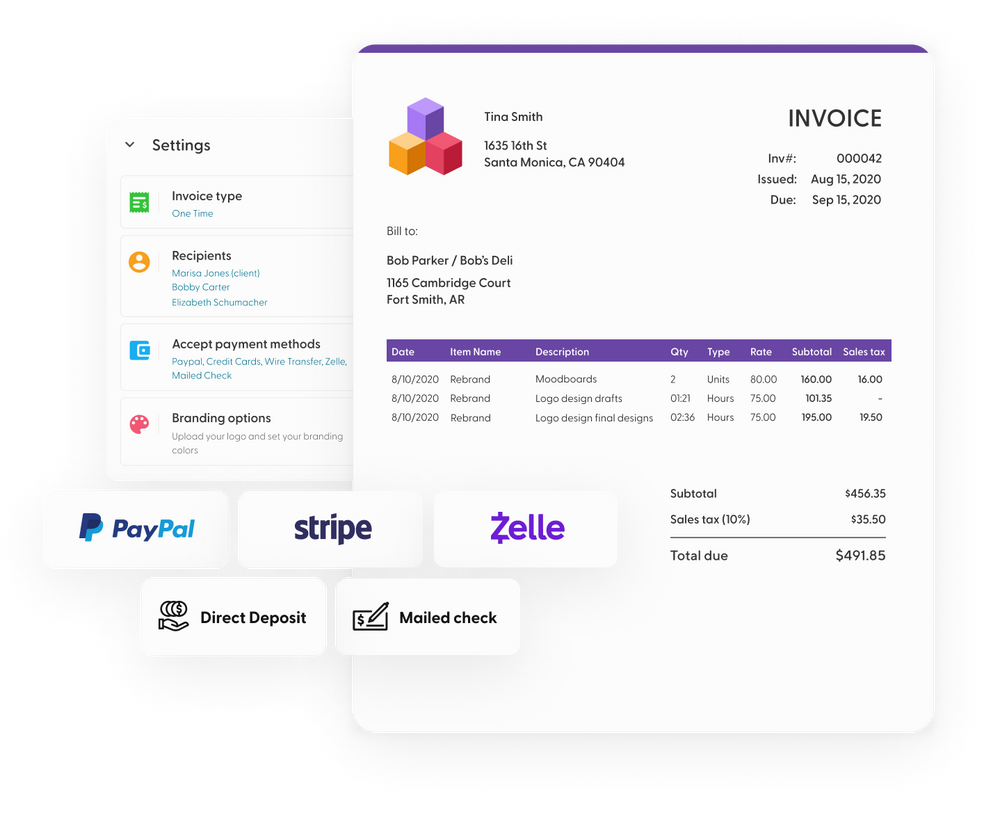Are you ready to get paid?
As a freelancer excitedly working with some of your first clients, of course you are. You’ve put in a lot of effort to build the relationship and do the work, and you’ve earned that payday.
There’s only one thing standing between you and your freelance income - your invoicing system. Freelancers have to manage their finances and serve as their own accounting department, including requesting payment from the companies and clients they serve.
So, what do you need to include when you’re writing an invoice for freelance work? We’ve put together a few steps to guide you through the process.
1. Use an electronic system to invoice for freelancing work
You are busy, and you don’t have time to manage everything with snail mail, or even by manually creating Word documents or PDFs that you can send via email.
Instead, use an electronic system to build and track your invoices. If you are doing multiple pieces of work for a client, or tracking hours throughout the month, you can start an invoice in your online invoice management system and add to it when necessary.
Creating and sending your invoices through an invoice management platform can save you time and increase your productivity in many ways. You’ll spend less time tracking down invoices or creating a separate filing system, and you’ll more easily be able to keep tabs on your freelance revenue and income trends as your business grows.
2. Include your brand and your details within your invoice
You want to stay consistent in the way you present yourself, even on something as mundane as email invoices. When you create a consistent look across all your documents, you give the impression that you are a serious businessperson, someone who’s in it for the long haul.
Add your logo and your business colors, along with your name and contact info, to further solidify your business brand and to show that even though you’re a freelancer, you’re running a pulled-together operation.
In fact, here’s a list of all the key details you should probably include when you’re writing a freelance invoice:
- Your name and contact info
- The client’s name and contact info
- An invoice number (for your records and tracking)
- An itemized list of services rendered
- Payment terms and dates
- Payment options
3. Specify the services you provided as a freelancer
It’s easier to avoid back-and-forth on your invoices, and to get paid faster, if you notate what you’re getting paid for.
For example, a freelancer writer may have an agreement with an organization to write six articles a month. It’s easier for you, and for the client, if you write out the details for each article - no one has to question which items have been invoiced, paid and crossed off a list.
By including those little details, it’s also more likely you’ll get your promised pay in your mailbox sooner, which is a boon to most freelancers running solopreneur operations.
4. Double check against your freelancing contract
When you made an agreement with your client, you likely agreed to a set of details that will govern your invoicing process, including your rate, how frequently you’ll invoice, and your payment terms.
When writing an invoice for freelance work, make sure you’re paying attention to those details. Skipping or misinterpreting something in the contract can create additional back-and-forth with the client or their accounts payable department, which can take too much of your time and slow down your payment processing.
If it’s your first time invoicing a client, it may help to ask them a few questions as well, just to make sure you’re handling things the way they prefer.
Some clients may have a specific template or process they like their freelancers to use to write and submit their invoices. Others may want you to copy them or other specific team members in order to make the process more efficient and to be aware of the invoice information before they’re questioned by the A/P team or asked to provide an approval.
And, of course, some companies may have set due dates for invoice processing, so getting your invoice in on time can mean a big difference in your timeframe for getting paid.
5. Include your payment terms and methods while writing your freelancing invoice
When you send an invoice for freelance work, the goal should be to get paid quickly. That means streamlining the process as much as possible for the people who are receiving it.
You can make it easier for them to pay by including payment terms and a clear due date, so they can process in a timely manner. And, if you include online payment options, you can allow (and actively encourage!) them to pay you faster.
If you’re using an invoicing tool to support your freelance work and make your bookkeeping easier, they may offer convenient payment processing options, so you can allow clients to pay you more quickly and more conveniently.
6. Be prepared for follow ups
In a perfect world, you’d send your invoice, get paid instantaneously, then go do something fantastically fun with that newfound freelance income.
This is not a perfect world.
Not only will you probably have to use your income to pay rent or something else equally boring, you’ll also have to, from time to time, remind your clients to pay you. This situation can feel very touchy, since you don’t want your clients to get the impression you distrust them or - more bluntly - that you think they’re freeloaders who won’t pay you for an honest day’s work.
It can be really helpful to have some automated reminders in place to send to clients when an invoice due date is skipped. These reminders can gently nudge them to make a payment, if you think they perhaps just missed it because they’re as busy as you are.
If you get to a point where you need to have a personal conversation with them, it helps to keep your tone non-judgmental, offer a reminder about your payment options and continue to show appreciation for their partnership. Many people will feel embarrassed if they’ve forgotten or been unable to pay, so showing some grace and empathy in your conversation can go a long way toward maintaining their loyalty.
Writing an invoice for freelance work isn’t necessarily fun, but the results - getting paid and continuing a great relationship with your clients - are well worth it.



